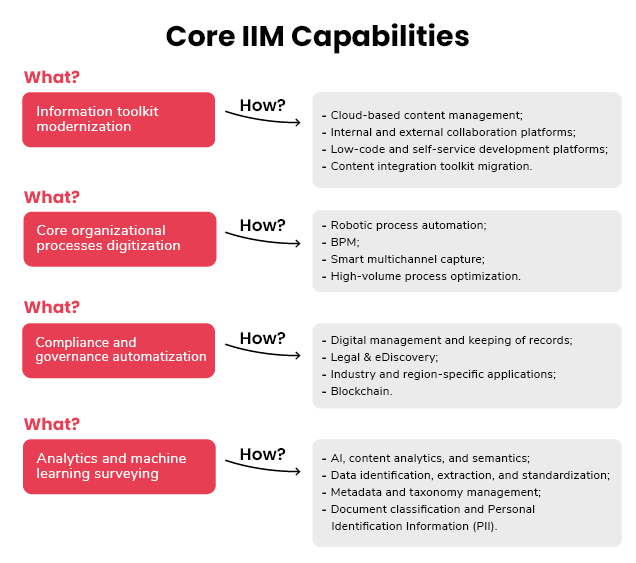Exponential data growth, intelligent data capture, artificial intelligence advancements (Machine Learning and Natural Language Processing (NLP)), Analytics, the Internet of Things (IoT), Robotic Process Automation (RPA), and an increasingly mobile and connected workforce.
Faced with so many new technologies, the ECM market boundaries have been greatly expanded. A whole new level of more intelligent Enterprise Content Management solutions is needed to keep up with today’s data increase and variety.
You probably already know that Information Management helps an organization with cost reduction, process agility, and many other benefits. But do you know the exact difference between Information Management and Intelligent Information Management (IIM)?
First, what is Information Management?
Information Management is nothing more than the collection and management of information, as well as its distribution to one or more target audiences.
AIIM agrees with this definition and adds that any organizational structure should be able to manage information throughout its lifecycle, regardless of origin or format (data, paper documents, electronic documents, audio, social business, video, etc.) for delivery via desktop and mobile devices.
Now, what does Intelligent Information Management mean?
Intelligent Information Management is a set of processes that aims to organize, manage and understand all types of data, including the integration of IP device discovery, data sharing, infrastructure databases, events, and alarms, as well as integrating third parties, automated patches, and applications.
Intelligent Information Management seeks to improve our understanding of all types of data. We need to consider how to manage our information more intelligently.
Users need to do much more than just capture documents and information, they need to absorb this information and transform it as quickly as possible into business processes, standardizing and automating them. In addition, they should be able to develop relevant policies and discard information with no business value.
Therefore, when we talk about “Smart” or “Intelligent” management, we’re not talking about just about huge, complex processes, with millions of attached documents. Simpler ones are still worth managing because they can be rich in relevant information. And automating them is a precondition for making digital transformation happen in your business.
However, it is important to remember that information management requirements vary by process and application.
Roadmap for Intelligent Information Management
According to AIIM, the way ECM is described is not a bad structure, but the way ECM has come to be seen is. So, the best applicable classification for it is Intelligent Information Management (IIM).

Previously, data management and content management were considered different things. But in the view of Intelligent Data Management, this distinction is far from ideal, since the problems that affect customers require both competencies to be resolved.
Concluding
John Mancini, AIIM author, speaker, and Chief Evangelist argues that enterprises need information management tools that are:
1. Easy to use;
2. Don’t depend on IT too much;
3. Easy to integrate into its daily processes.
And with IIM being a trend, which may or may not be accepted by the market, what we do know for a fact is that today’s data potential growth brings a very concrete need for more efficient information management solutions.
Test Fusion Platform right now for 15 days free of charge and learn more about the best Information Management solution, one that is in line with all market practices!
Reference: AIIM





